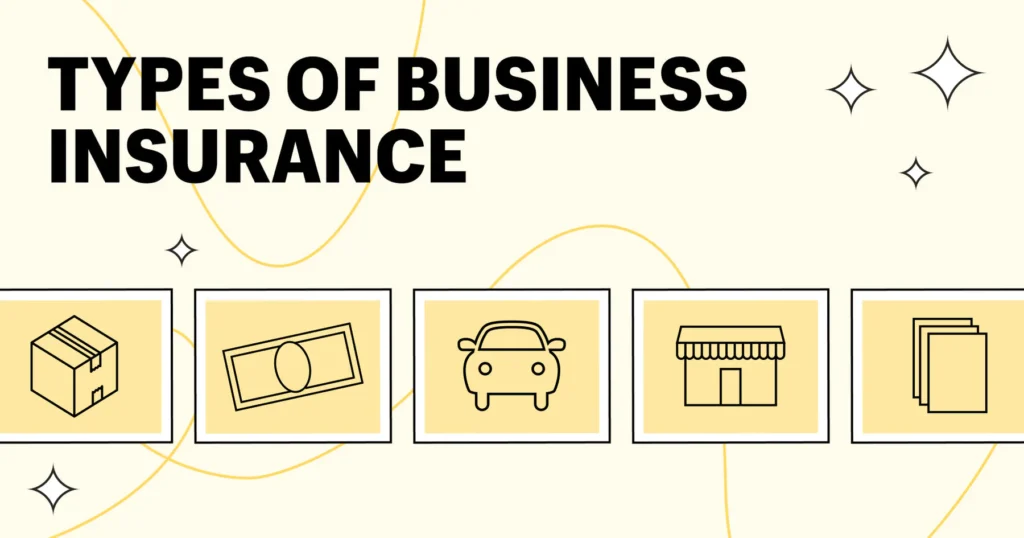
Top 5 Types of Business Insurance Every Small Business Should Consider
Running a small business comes with a host of risks, from property damage and customer lawsuits to employee injuries and cyberattacks. To safeguard your business from these potential hazards, having the right insurance coverage is essential. Insurance not only protects your assets but also ensures that you are legally compliant and can continue operations even in the face of unforeseen challenges.
In this article, we will explore the top 5 types of business insurance every small business owner should consider. From basic liability coverage to specialized protection, understanding these policies will help you make informed decisions about the best insurance options for your business.
1. General Liability Insurance
What is it? General liability insurance (often referred to as CGL or commercial general liability) is one of the most important and basic types of coverage for any small business. It provides protection against third-party claims of bodily injury, property damage, and personal injury caused by your business operations.
Why You Need It: General liability insurance covers the costs of legal defense, settlements, and medical expenses if your business is sued for causing harm to someone or their property. For example, if a customer slips and falls at your store or if an employee accidentally damages a client’s property, this insurance will protect your business from the financial fallout.
Key Coverages of General Liability Insurance:
- Bodily Injury: Covers medical expenses and legal fees if a customer or other third party is injured on your business premises.
- Property Damage: Protects against damages to someone else’s property caused by your business operations or employees.
- Personal Injury: Includes defamation, false advertising, and violations of privacy.
How Much Does It Cost? The cost of general liability insurance typically ranges from $400 to $1,500 per year for a small business, depending on factors such as the size of your business, industry, and location.
2. Property Insurance
What is it? Property insurance provides coverage for damage to your business property, including buildings, equipment, inventory, and other physical assets. This policy can cover damage due to natural disasters, fires, theft, or vandalism.
Why You Need It: For businesses that own physical assets like inventory, office space, or machinery, property insurance is a must. Without this coverage, a disaster such as a fire, storm, or break-in could result in significant financial losses, making it difficult for your business to recover.
Key Coverages of Property Insurance:
- Building Coverage: Pays for repairs or replacement of your business premises after damage.
- Equipment Coverage: Covers the cost of replacing business equipment such as computers, machinery, and tools.
- Inventory Coverage: Covers goods or products you sell, providing protection in case of theft, fire, or other damages.
How Much Does It Cost? The cost of property insurance varies widely based on your location, the value of your assets, and the type of coverage you choose. On average, small businesses pay between $500 and $2,000 per year for property insurance.
3. Workers’ Compensation Insurance
What is it? Workers’ compensation insurance is designed to provide benefits to employees who are injured or become ill as a result of their work. This coverage can include medical expenses, lost wages, rehabilitation costs, and even death benefits in the case of a fatal work-related accident.
Why You Need It: Workers’ compensation is not only a legal requirement in most states for businesses with employees, but it also helps protect both your employees and your business. Without workers’ compensation insurance, your business could be exposed to lawsuits if an employee is injured on the job. Moreover, your employees will feel more secure knowing that their health and well-being are covered in case of an accident.
Key Coverages of Workers’ Compensation Insurance:
- Medical Expenses: Covers the cost of medical treatment for work-related injuries or illnesses.
- Lost Wages: Provides compensation for employees who are unable to work due to injury or illness.
- Disability Benefits: Offers compensation if an employee is permanently disabled due to a work-related incident.
How Much Does It Cost? The cost of workers’ compensation insurance depends on factors such as the nature of the work, the size of the business, and your claims history. Typically, small businesses pay an average of $0.75 to $2 per $100 in payroll.
4. Business Interruption Insurance
What is it? Business interruption insurance (also known as business income insurance) provides coverage for lost income if your business is temporarily unable to operate due to a covered event, such as a fire, natural disaster, or civil disturbance. This policy helps cover ongoing expenses such as rent, utilities, and employee wages during a shutdown period.
Why You Need It: If your business is forced to close due to unforeseen circumstances, business interruption insurance ensures that your expenses are covered while you recover. Without this coverage, your business could struggle to stay afloat during difficult times. For example, if a fire causes severe damage to your office or warehouse, business interruption insurance can help replace lost revenue.
Key Coverages of Business Interruption Insurance:
- Lost Income: Covers the revenue your business would have earned if it had remained open.
- Fixed Costs: Pays for ongoing expenses such as rent, utilities, and employee salaries while your business is shut down.
- Temporary Relocation: Covers the cost of moving to a temporary location if your business premises are damaged.
How Much Does It Cost? The cost of business interruption insurance is typically added to your property insurance policy and can range from $500 to $1,500 annually depending on your business’s revenue and location.
5. Professional Liability Insurance
What is it? Professional liability insurance (also known as errors and omissions insurance or E&O insurance) protects businesses that provide professional services or advice. It covers claims of negligence, errors, or omissions that result in financial loss for your clients.
Why You Need It: If your business offers expert advice or services (e.g., consulting, accounting, or legal services), professional liability insurance is essential. It provides protection in the event a client sues you for mistakes or omissions that lead to financial loss. Even if you are not at fault, this coverage can help pay for legal fees and settlements.
Key Coverages of Professional Liability Insurance:
- Negligence: Covers claims that your business was negligent in providing services.
- Errors and Omissions: Protects against claims of mistakes or oversights in your professional work.
- Legal Defense: Covers the cost of defending your business in court, including lawyer fees and court costs.
How Much Does It Cost? Professional liability insurance typically costs between $500 and $3,000 annually, depending on the industry, the size of the business, and the level of coverage.
Why Is Business Insurance Important?
Business insurance is vital for managing risk, protecting your assets, and ensuring business continuity. It helps safeguard your business from the financial impact of accidents, lawsuits, and unforeseen events. In addition, certain types of insurance, such as workers’ compensation and liability coverage, are often required by law, depending on your industry and location.
Without the right insurance, your business could be vulnerable to financial ruin if an accident or lawsuit occurs. By investing in business insurance, you can protect yourself, your employees, and your clients, while ensuring that your business is in a position to recover quickly from any setbacks.
FAQs
- What types of insurance do I need for my small business? Every small business should consider general liability insurance, property insurance, workers’ compensation, business interruption insurance, and professional liability insurance.
- How much does business insurance cost? The cost of business insurance varies based on the type of coverage, the size of your business, and your industry. Small businesses typically pay between $1,000 and $3,000 annually for insurance.
- Is business insurance mandatory? Some types of insurance, such as workers’ compensation, are legally required in many states, while others are optional but highly recommended to protect your business.
- What is the difference between general liability and professional liability insurance? General liability insurance covers third-party bodily injury, property damage, and personal injury claims, while professional liability insurance covers claims of negligence or errors in providing professional services.
- Do I need business interruption insurance? If your business depends on a physical location or equipment, business interruption insurance can help cover lost income and ongoing expenses in case of a disaster or unexpected closure.
- Is workers’ compensation insurance required? In most states, workers’ compensation insurance is required if your business has employees. It helps cover medical costs and lost wages if an employee is injured at work.
- Can I add additional coverage to my business insurance policy? Yes, many insurers offer the option to customize your policy with additional coverage, such as cyber liability, product liability, and commercial auto insurance.
- How do I choose the right insurance for my business? Assess your business risks and consult with an insurance agent to determine which coverage types are best suited to your needs.
- How can I save on business insurance? Consider bundling multiple policies, maintaining a safe workplace, and shopping around for quotes to get the best rate.
- What happens if I don’t have insurance for my business? Without insurance, your business could face significant financial losses in the event of a lawsuit, accident, or natural disaster. Insurance helps mitigate these risks.
External Links:
- Small Business Insurance: What You Need to Know – The Hartford
- Guide to Business Insurance – Insurance.com
- Business Insurance Types & Benefits – Nationwide
By understanding the top five types of business insurance, you can ensure your business is well-protected and positioned for long-term success. As a small business owner, investing in the right coverage will help you manage risks, comply with regulations, and focus on growing your business with peace of mind.
Image credit – shopify.com


